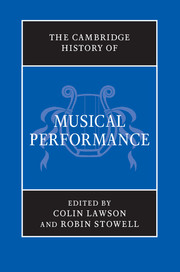Book contents
- Frontmatter
- PART I PERFORMANCE THROUGH HISTORY
- PART II PRE-RENAISSANCE PERFORMANCE
- PART III PERFORMANCE IN THE RENAISSANCE (C. 1430–1600)
- PART IV PERFORMANCE IN THE SEVENTEENTH CENTURY
- PART V PERFORMANCE IN THE ‘LONG EIGHTEENTH CENTURY’
- PART VI PERFORMANCE IN THE NINETEENTH CENTURY
- PART VII THE TWENTIETH CENTURY AND BEYOND
- PART VIII
- 32 The future?
- Select bibliography
- Index
32 - The future?
from PART VIII
Published online by Cambridge University Press: 28 March 2012
- Frontmatter
- PART I PERFORMANCE THROUGH HISTORY
- PART II PRE-RENAISSANCE PERFORMANCE
- PART III PERFORMANCE IN THE RENAISSANCE (C. 1430–1600)
- PART IV PERFORMANCE IN THE SEVENTEENTH CENTURY
- PART V PERFORMANCE IN THE ‘LONG EIGHTEENTH CENTURY’
- PART VI PERFORMANCE IN THE NINETEENTH CENTURY
- PART VII THE TWENTIETH CENTURY AND BEYOND
- PART VIII
- 32 The future?
- Select bibliography
- Index
Summary
‘Without music, life would be a mistake, a hardship, an exile’, wrote the German philosopher Friedrich Nietzsche, a claim that is fully endorsed by the integral role that music has always played in society. However, for all its well-recognised transcendent qualities, classical music of the Western art tradition has sometimes appeared marginalised alongside jazz, popular and other musics, and it has recently had to contend with a change from its privileged position in society to one in which it is repeatedly challenged by other forms of music and mass entertainment. One may welcome the disappearance of the old patrician assumptions that classical music is the only truly valuable part of our musical activity and yet feel alarmed at its ensuing undervaluing. Performers now have an important advocacy role in relation to the inherent value of music, along with its transformational powers in health, education and well-being.
The musical future is impossible to predict with any degree of assurance or accuracy, not least because of the volatility of the global economy, shifting musical tastes, and the speed with which technological developments are being achieved, bringing with them changes in music consumption and discovery. Yet the potential of classical music for elemental excitement is something to which every performer will want to aspire, whatever their working environment.
- Type
- Chapter
- Information
- The Cambridge History of Musical Performance , pp. 815 - 833Publisher: Cambridge University PressPrint publication year: 2012

